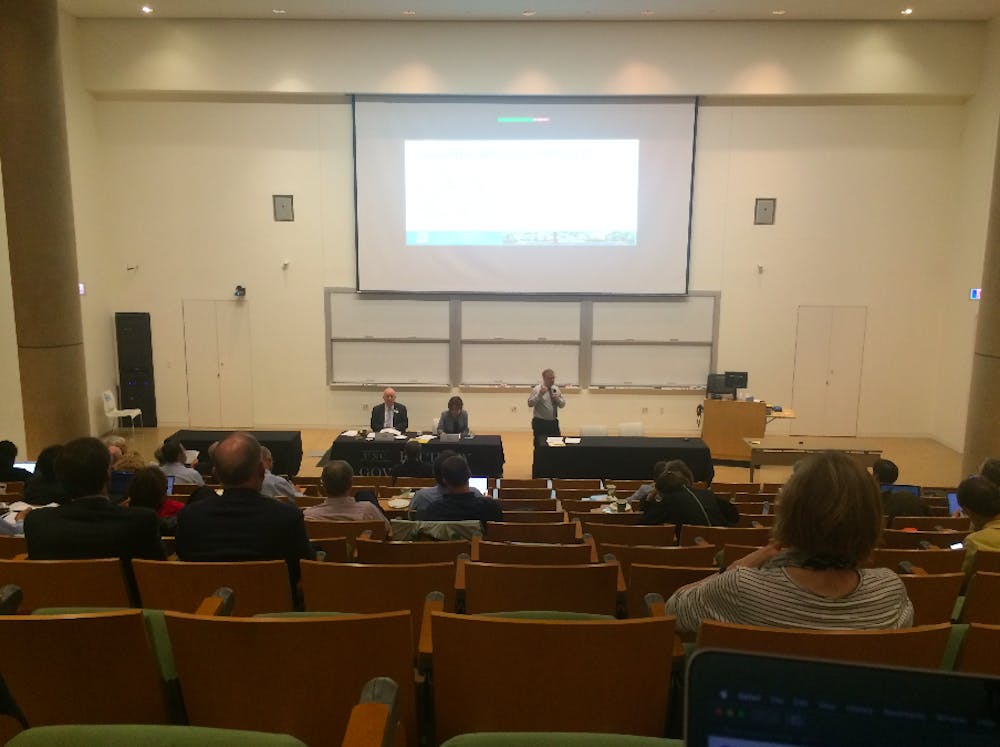On Apr. 10, conservative American news outlet The Daily Wire published a Youtube video showing interviews with attendees and a performance by rapper Tamer Nafar, who labels himself and the crowd as anti-Semitic several times throughout the song. UNC organizations, including the North Carolina Hillel and UNC Global, have released statements condemning anti-Semitism in the wake of the video and the conference.
UNC School of Law professor Eric Muller expressed concern over the “deeply chilling” performance, where Nafar started a call-and-response of “I fell in love with a Jew” with audience members.
“I was deeply disturbed by it when I saw the video yesterday of the performance,” Guskiewicz said in response to Muller. “It’s not what Carolina’s about, and we will do everything possible to make sure that it would never happen again.”
Scholarship and Financial Aid funding
Chairperson of the Faculty Committee on Scholarships, Awards and Student Aid and law school professor Donald Hornstein presented the status of financial aid for students at the University.
Hornstein looked into the effects of the Board of Governors’ 2014 cap-and-freeze policy, which cut the amount of tuition revenue the University could use on need-based aid from 20.9 percent to 15 percent.
Hornstein said the scholarship budget was in the red for the first time in his tenure as chairperson.
“Look at what is going to be considered if we do not find the resources,” Hornstein said. “We are going to start backpedaling on the Covenant. It is being discussed now, and I am privy to those discussions, and this is a warning. A clear signal needs to be sent from the administration and the campus, and us, that that is something that we will not tolerate.”
Splitting from Elsevier
Vice Provost of University Libraries and head librarian Elaine Westbrooks, and Mark Crescenzi, chairperson of the Administrative Board of the Library and the Department of Political Science, presented a resolution to contain the costs of publishing and accessing research, and to promote transparency in the licensing process.
The University currently licenses with Elsevier, which is both a publisher and a provider of research articles via ScienceDirect, an extensive database of journals. Universities pay millions — the University of California system’s ScienceDirect subscription, which they recently dropped, cost them $11 million last year alone — for access to journals, and sign non-disclosure agreements, which bar them from sharing exactly how much they pay Elsevier.
Medical school faculty such as Amy Levine, a professor of pediatric emergency medicine, said they were worried that moving to a model where they would have to wait for article access would greatly limit their ability to quickly treat patients.
To get the day's news and headlines in your inbox each morning, sign up for our email newsletters.
“I just left a shift where I needed to know in five minutes whether the medicine this kid just got was going to cause a reaction,” Levine said. “We were able to look it up, we were able to get the data, and it changed what we did.”
In response, Westbrooks said the library was looking into automated models where access would be expedited.
Proposed resolution to investigate UNC Police conduct
History professor Jay Smith presented a proposal for a resolution to address the relationship between UNC Police and students, especially student protesters. The meeting took place following the announcement of UNC Chief of Police Jeff McCracken's July resignation.
“This resolution calls for an open, transparent investigation of police behavior in these events over the past several months,” Smith said. “It calls on administration to dismiss officers who are involved in unethical or possibly illegal activities, and it calls for an investigation into whether there are any connections between campus police and white supremacist organizations, as has been alleged, repeatedly, over the past couple of months.”
Smith said he would submit the proposed resolution to the Faculty Executive Committee for review.
New General Education curriculum to be established by fall 2021
The Faculty Council passed a resolution to adopt the IDEAs in Action curriculum, an update to the current Making Connections curriculum, by the Fall of 2021.
The new curriculum will change general education requirements, introducing new categories such as Ideas, Information and Inquiry. It will focus on developing capacities in students, which the curriculum proposal defines as “flexible and adaptable modes of thought and action that can be used in different contexts, including new contexts that will emerge in the future.”
Goodbye to Leslie Parise
The meeting ended with a ceremonial resolution presented to Chairperson Parise in honor of her service during her time as chairperson of the Faculty Council, which spanned the Charlottesville protests, the toppling of Silent Sam and the departure of Chancellor Folt.
Applause sounded through the room as the resolution passed unanimously.
university@dailytarheel.com



